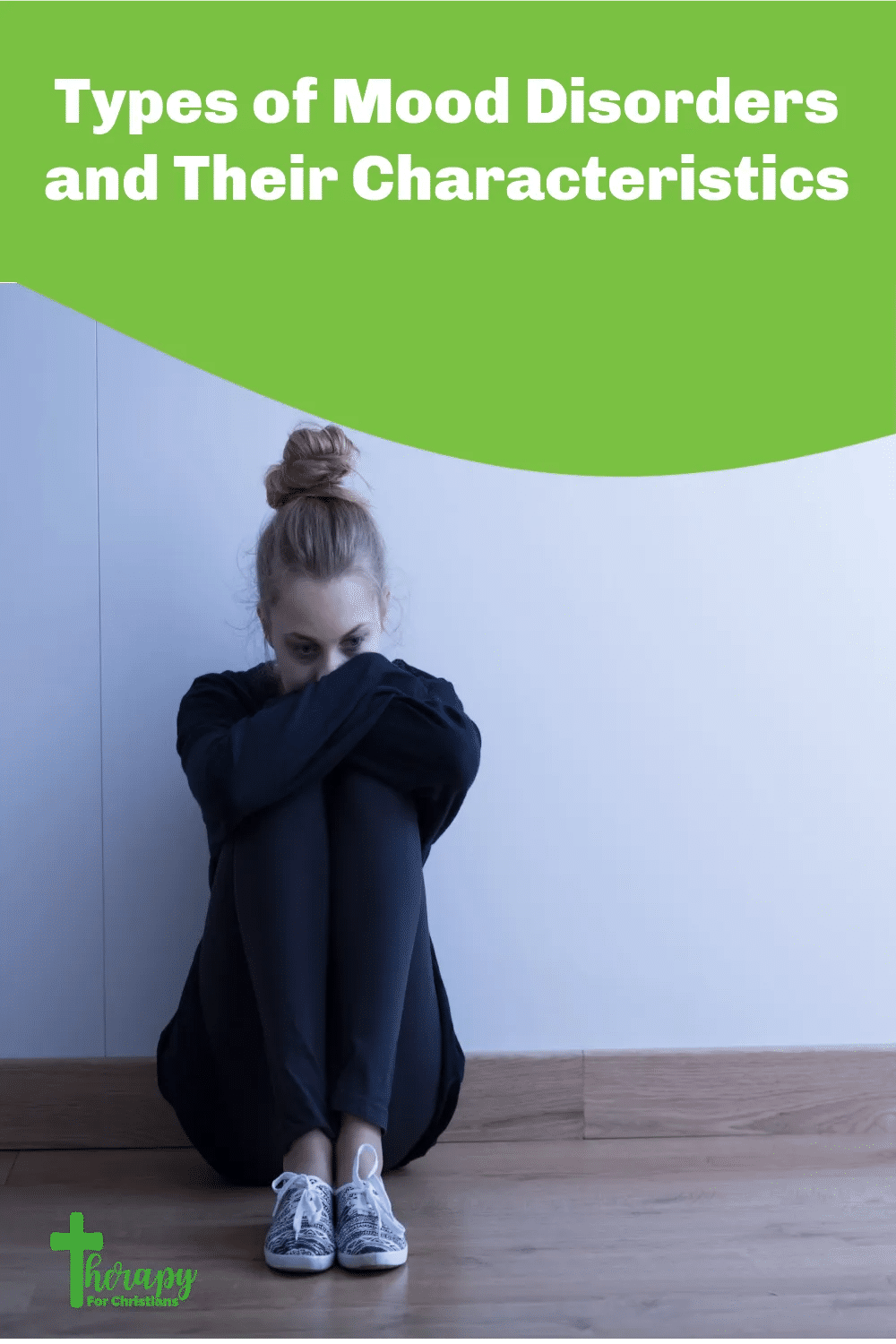

The National Institutes of Health (NIH) estimate that 20–30 million US adults (20% of the population) will receive a diagnosis of a mood illness each year. Nearly half of that 10% will experience severe symptoms.
Given the frequency of mood disorders, it's crucial to learn more about their characteristics as well as their diagnosis, management, and treatment.
The characteristics of a mood disorder, various forms of mood disorders, related causes and risk factors, as well as accessible diagnostic and treatment protocols, will all be covered in the sections that follow.

What Exactly Are Mood Disorders?
An altered emotional state that lasts for a while and persists chronically is a mood disorder.
The signs of a mood disorder, such as chronic depressive disorder, might endure longer than two years while the less severe symptoms of depression may only last a few days to a few weeks. The true distinction between a person with a mood disorder and someone who simply experiences occasional mild mood swings within a particular day is made by the symptoms' protracted duration.
Chronic mood disorders can have devastating effects on a person's physical and emotional health, harming them and the people in their life who are close to them. Mood disorders can range in severity, but they typically call for more intensive medical and psychological treatment.
What Causes Mood Disorders?
Mood disorders are complex conditions influenced by a combination of genetic, biological, environmental, and psychological factors. The specific cause of mood disorders can vary among individuals, and it's often a result of the interplay between multiple factors. Here are some key contributors:
Biological Factors:
Genetics: A family history of mood disorders increases the risk. Certain genes may make individuals more susceptible to developing mood disorders.
Brain Chemistry: Imbalances in neurotransmitters, such as serotonin, norepinephrine, and dopamine, play a role in mood regulation. Changes in the functioning of neural circuits and brain structures involved in emotional processing can contribute to mood disorders.
Environmental Factors:
Stress: Chronic stress can contribute to the development or exacerbation of mood disorders. Stressful life events, such as trauma, loss, or abuse, may trigger the onset of a mood disorder in susceptible individuals.
Early Life Experiences: Adverse childhood experiences, including neglect or abuse, can impact the development of the brain and increase vulnerability to mood disorders later in life.
Substance Abuse: Drug or alcohol abuse can contribute to mood disorders. Substance use can disrupt brain function and exacerbate underlying genetic or environmental factors.
Psychological Factors:
Personality Traits: Certain personality traits, such as high levels of neuroticism or perfectionism, may contribute to the development of mood disorders.
Cognitive Patterns: Negative thought patterns, distorted thinking, and irrational beliefs can contribute to the development and maintenance of mood disorders.
Medical Conditions:
Chronic Illness: Some medical conditions, such as chronic pain or neurological disorders, can contribute to the development of mood disorders.
Hormonal Changes: Changes in hormonal levels, as seen in conditions like thyroid disorders or during certain life stages (e.g., menopause), can impact mood.
Medications and Substance Use:
Certain Medications: Some medications, including certain corticosteroids and medications for cardiovascular diseases, can impact mood as a side effect.
Substance Abuse: The use of certain substances, including drugs and alcohol, can contribute to mood disorders.
Mood Disorder Types
Bipolar disorder and depression are the two well-known and frequently diagnosed kinds of mood disorders. These words refer to a more particular subtype of mood illness. These subtypes will be distinguished by the severity of the accompanying symptoms.
Experts believe that anomalies in brain chemistry that impair the action of the brain neurotransmitters norepinephrine, serotonin, and dopamine are partially to blame for the great majority of mood disorders. Environmental events, lifestyle choices, and genetics are among more potential causes.
There are several common mood disorders, each characterized by distinctive features and symptoms. Here are some of the most prevalent mood disorders:
Major Depressive Disorder (MDD):
Characteristics: Persistent and severe low mood, feelings of hopelessness, and a lack of interest or pleasure in activities.
Symptoms: Changes in appetite or weight, sleep disturbances, fatigue, difficulty concentrating, feelings of worthlessness, and suicidal thoughts.
Note: If you are someone you love are suffering with depressive symptoms, check out these 10 Bible verses to help with depression.
Bipolar Disorder:
Characteristics: Involves episodes of major depression and episodes of mania or hypomania (less severe than mania).
Symptoms: During depressive episodes, symptoms are similar to major depressive disorder. During manic or hypomanic episodes, individuals may experience elevated mood, increased energy, racing thoughts, and impulsive behavior.
Persistent Depressive Disorder (Dysthymia):
Characteristics: Chronic low-grade depression lasting for at least two years.
Symptoms: Similar to major depressive disorder but less severe. Individuals may experience a persistent sad or irritable mood, changes in appetite, sleep disturbances, low energy, and feelings of hopelessness.
Cyclothymic Disorder:
Characteristics: Chronic mood disturbance involving numerous periods of hypomanic symptoms and depressive symptoms over a span of at least two years.
Symptoms: Less severe than bipolar disorder but more persistent. Individuals may not experience full-blown manic or depressive episodes.
Seasonal Affective Disorder (SAD):
Characteristics: Recurrent depressive episodes that occur at a specific time of the year, usually in the fall or winter when there is less sunlight.
Symptoms: Typical depressive symptoms, including low energy, irritability, changes in sleep and appetite, and difficulty concentrating.
Premenstrual Dysphoric Disorder (PMDD):
Characteristics: Severe mood disturbances that occur in the luteal phase of the menstrual cycle.
Symptoms: Marked mood swings, irritability, sadness, anxiety, and physical symptoms such as bloating and breast tenderness.
Disruptive Mood Dysregulation Disorder (DMDD):
Characteristics: Primarily diagnosed in children and adolescents. It involves severe and recurrent temper outbursts that are out of proportion to the situation.
Symptoms: Persistent irritability or anger between outbursts.
Adjustment Disorders with Depressed Mood:
Characteristics: Depressive symptoms that occur in response to a significant life stressor or change.
Symptoms: Similar to major depressive disorder but directly linked to a specific stressor.
These disorders can significantly impact daily functioning and quality of life. It's important to note that the diagnosis and treatment of mood disorders should be conducted by qualified mental health professionals. If you or someone you know is experiencing symptoms of a mood disorder, seeking professional help is crucial for accurate diagnosis and appropriate intervention.
Examples of mood disorders and their subtypes include the following:
Clinical or Major Depressive Disorder
Pregnancy Depression
Psychosis
Depression caused by medication
Disorder of the mind
SADs (Seasonal Affective Disorder)
Significant Depressive Disorder
Major depressive disorder is a mental health illness that causes intense sadness that lasts for two weeks to over two years. It is also known as chronic depressive disorder, clinical depression, or persistent depression.
Hopelessness, restlessness, difficulty sleeping, lack of attention and focus, low self-esteem, lack of food, and a general sense of doom are further signs of severe depressive illness.
Postpartum depression, dysthymia, psychotic depression, and medically induced depression are all subtypes of major depressive disorder.
Disorder of the Mind
The basic concept of bipolar disorder is characterized as chronic and intense mood swings, including both periods of manic depression and bursts of euphoria. There are many different types and severity levels of bipolar disorder. Both ends of the mood spectrum can swiftly cause people to lose their capacity to operate normally.
Bipolar patients are more likely to experience depression since the signs of both disorders frequently coexist. Additionally, there is a parallel association between anxiety disorders and depression.
Bipolar I and II, cyclothymia, and other nonspecific diagnoses of manic depressive disorder are bipolar disorder subtypes.
Depressive Seasonal Disorder
A type of depression known as seasonal affective disorder (SAD) only manifests itself during particular times of the year, most frequently during the winter. Although SAD symptoms can last only a few weeks or months rather than years, they are more tolerable than those of clinical depression.
The extreme northern and southern latitudes, when sunshine exposure is at its lowest throughout the winter, are the places in the globe where SAD is most common.
Although SADs are typically regarded as less severe than the majority of other mood disorders, in the most severe cases, symptoms can nevertheless become fairly intolerable.

Risk Elements Linked to Mood Disorders
The most frequent risk factors for various mental disorders are as follows:
Genealogy and genetics
Inappropriate Brain Chemistry
Stressors in the environment (Work, Relationships, Isolation, Loneliness, Traumatic Events)
Personal Choices (Drug and Alcohol Abuse)
While there is no guarantee that risk factors will influence the development of a mood disorder, it is possible to reduce the risk by leading a healthy lifestyle, abstaining from substance misuse, and managing stress.
Diagnosis of Mood Disorders
The DSM-5 Criteria for each individual illness are used to make the diagnosis of each mood disorder. A specific mood disorder is one that fits a number of criteria. As an illustration, the presence of five or more symptoms from the DSM-5 is required in order for the diagnosis in question to be made.
Lack of interest in enjoyable activities, insomnia, considerable weight loss, exhaustion, and lack of concentration are a few indicators of depression. The DSM-5 lists a number of additional potential symptoms, and the person must consistently experience at least five of these symptoms over the course of two weeks.
Depression Treatment
Psychotherapy and drug therapy will probably be used in conjunction to treat mood disorders. In minor cases, however, psychotherapy alone is adequate to treat the problem. When medical attention is necessary, Amitriptyline, Celexa, Cymbalta, Paxil, Zoloft, and Prozac are treatment options offered. By boosting the quantity of serotonin or norepinephrine available for homeostatic mechanisms and further post-synaptic nerve stimulation, these drugs aid in healing.
The best-qualified person to identify and manage this condition is a medical expert with experience in mental health care or mental health professionals.
Frequently Asked Questions About Mood Disorders
Below are other frequently asked questions about mood disorders.
What is the difference between mood disorders, depressive disorders, and bipolar disorders?
Mood disorders is a broad term that encompasses a range of mental conditions in which a person's mood is disturbed in some way. This includes depressive disorders, which are characterized by periods of deep sadness or hopelessness, and bipolar disorders, which involve fluctuations between depressive and manic states.
How are mood disorders diagnosed?
Diagnosing mood disorders typically involves a comprehensive evaluation conducted by a mental health professional. This includes an assessment of symptoms against the criteria outlined in the DSM-5. For instance, to be diagnosed with a depressive disorder, one must consistently experience at least five symptoms from the DSM-5 over a two-week period.
What is the difference between Bipolar I and Bipolar II disorder?
Bipolar I disorder is characterized by at least one manic episode, potentially followed by major depressive episodes. On the other hand, Bipolar II disorder involves one major depressive episode and at least one hypomanic episode, which is less severe than a full-blown manic episode.
How is a substance-induced mood disorder treated differently from unspecified depressive disorder?
Substance-induced mood disorder results from the use or withdrawal from drugs or alcohol and is treated by addressing the substance abuse issue alongside mood symptoms. An unspecified depressive disorder is a category used when the symptoms, though significant, do not meet the full criteria for any specific depressive disorder. Treatment typically involves psychotherapy, medication, or a combination of both.

Final Thoughts on Mood Disorders
Mood disorders don't just go away on their own; the affected person has to be assessed and given treatment. If not treated, the illness may deteriorate, resulting in emotional distress, physical exhaustion, and considerable disruption of everyday activities.
If symptoms are noticed and they start to get worse, get help right once from a professional. You can find a counselor that shares your faith by searching our database here: Christian Mental Health Professionals. The best results come from early diagnosis and therapy.
Before you leave, we would appreciate it if you helped us spread the word by sharing, tweeting, pinning, etc. this post.
About the Author:
 Corine Williams, Ph.D. is Clinical Psychologist that is currently seeing clients in the States of Maryland, New Jersey, and New York. You can find out more about her practice by visiting
Corine Williams, Ph.D. is Clinical Psychologist that is currently seeing clients in the States of Maryland, New Jersey, and New York. You can find out more about her practice by visiting
www.therapyforchristians.com/corinewilliams. In addition to providing individual therapy, Dr. Williams is also passionate about writing books and designing merchandise that educate, uplift, and normalize mental health subject in the Christian community. You can find out more about her at www.booksbycorine.com or by visiting her amazon profile here: https://www.amazon.com/Corine-Hyman/e/B00AWZ5FL2
Help us increase mental health awareness in the Christian community by donating through our paypal link here: www.paypal.com/therapyforchristians, joining our mailing list by clicking below, or join our provider list here: Provider listing
Disclaimer: the information, including but not limited to, text, graphics, images and other material contained on this article are for informational purposes only. No material on this site is intended to be a substitute for professional medical advice, diagnosis or treatment. If you are looking for a Christian counselor near you, please check out our directory located here: Christians Therapist Near Me
.png)














